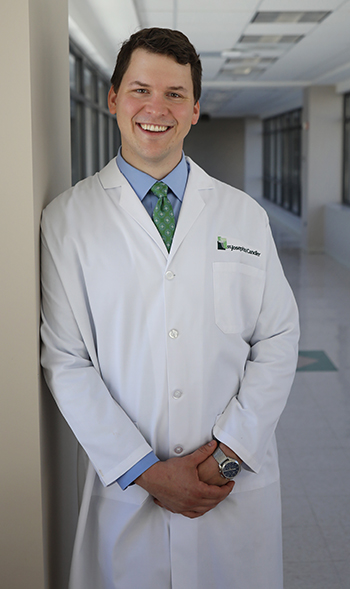Why should I or my parents see a geriatric doctor?
Family Health
Board-certified in geriatric medicine, St. Joseph’s/Candler Primary Care Physician Dr. Andrew Mrugala explains taking care of those 65 and older
When we are kids, we see a pediatrician for our care. If we have an issue with our heart, we see a cardiologist. Problems with your feet? There’s trained podiatrists who can help.
So as you get older in life why would you not want to see a doctor that specializes in care for the elderly?

Dr. Andrew Mrugala is one of the Savannah region’s few physicians who is board certified in geriatric medicine, which is the branch of medicine that deals with the unique medical and social aspects of caring for older adults. Medicare defines geriatrics as those 65 and older.
“Really the goal of geriatric healthcare, and all healthcare in general, is to maintain the maximum amount of function and independence throughout the aging process,” says Dr. Mrugala, who practices at the St. Joseph’s/Candler Primary Care office in Pooler. “It’s recognizing problems before they arise and mitigating risks. It’s the exact same medicine but applied through a lens that applies specifically to this population.”
As we age, so does our body – everything from kidney function to our joints to our eyes. And it’s usually at no fault of our own, but part of the natural aging process. There are also social aspects of life that change that may hinder healthcare, such as being less proficient with technology or having transportation to appointments or remembering to take your medication.
“There are a lot of unique issues in this population that having a little bit of extra training can be helpful to the patient,” Dr. Mrugala says. “Not all problems as we get older are necessarily solvable. They sometimes need to be fine-tuned or addressed in a special way that makes it not as impactful on your life.”
Take for example a grandfather who is having trouble hearing his grandkids. It could be something as simple as flushing out his ears so he can hear better. Or, for instance, an older woman with incontinence issues that are keeping her up all night. Dr. Mrugala may take a look at her medications and discover she’s on a diuretic for blood pressure. Yes, it’s helping her blood pressure but interfering with her quality of life by disturbing her sleep. Dr. Mrugala will look at what can be done to maintain her blood pressure but also reduce incontinence symptoms.
“I think once you develop a perspective of how to approach an older adult, there are so many small things you can do to dramatically improve their quality of life,” Dr. Mrugala says.
And that perspective is one thing that makes seeing a geriatrician so valuable. Like other primary care doctors, Dr. Mrugala spent three years doing a family medicine residency, which is the normal training. He then did an extra year of training at Duke University in geriatrics to earn a certificate of added qualification in geriatrics through the American Board of Family Medicine.
So when is it time for you or a parent to start seeing a geriatrician? It could be when you turn 65, or there are things you can look for. Maybe your parents aren’t getting around as well as they used to. Maybe they’ve slipped on paying bills or are missing appointments. Do you feel like you’re spinning your wheels with your diabetes management or pain tolerance? A geriatrician can help.
“I think it’s very gratifying to take care of very complicated patients where there is a lot of information to keep track of and care for,” Dr. Mrugala says.
“I think geriatric patients are surprisingly receptive to newer treatments and technologies – as long as it helps. I think that’s the biggest thing. As long as it can be explained in a way that they can understand and conceptualize and be secure in, then they are as willing as anybody to try new things.”
To schedule an appointment with Dr. Mrugala, call 912-748-1999 or request one online now.